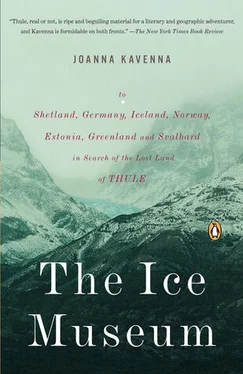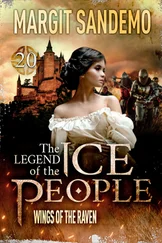And the journey to Thule was a next-best to the Pole for Victorian women like Mrs. Alec Tweedie. Mrs. Alec Tweedie, sometimes known as Ethel, was a second string on the polar stage. She had a fashionable list of explorer friends, Nansen among them, and she waved off Frederick Jackson from Cannon Street Station, when he set off for the North Pole in 1894. Jackson was even carrying a letter when he met Nansen, from Mrs. Alec Tweedie, addressed in waggish style to Dr. Fridtjof Nansen at the North Pole. Mrs. Alec Tweedie had waited for Nansen, looking forward to waltzing around ballrooms in London with the triumphant explorer, as he had promised. Tweedie’s Ultima Thule, Burton’s Ultima Thule, was a holiday in emptiness for the Victorians, the northern lands a playground for summer trippers in crinolines and smart collars. ‘The next best thing to being at the North Pole itself, and far more comfortable!’ wrote Mrs. Tweedie, like a brochure. The Victorians in search of something a little extraordinary set off on steamships, preparing themselves for the discomfort of the crossing, the surliness of the ocean, and the inevitable bouts of seasickness. It was voyage enough for the Victorian afflicted with the nature craze, accessible for society types, in search of a retreat from their satin shoes and their long white gloves.
Everything was processed through a wild chorus of hyperbole, every detail of the voyage laced with myth and interest. Feeling the epic past, the Victorians made much of the journey up the coast of Britain, even though they travelled along a tourist trail. They took steamers from Edinburgh. Edina, Dun-Edin, Quebec of the Old World, the Grand Chartreuse of Presbyterianism, Modern Athens they cried, passing out of the port. Adieu, O Edinburgh! they sighed, looking out towards the ocean, the ocean wearing an azure and gold robe, they wrote. Smoke was rising from the many steamers ploughing a path through the sea; smoke was forming a thin canopy, drifting across the pale blue waters. Their steamships were crowded, carrying dozens in a state of misery, making slow progress through the waves. The passengers complained bitterly, finding that their ships had no bath and the food was greasy—and they listed it all, writing it all out in their immaculate diaries: giant tureens of oleaginous soup, fish which could not be kept quite fresh, and chunks of greasy meat. Like an explorer, checking supplies, Mrs. Alec Tweedie provided a list of the clothing required for the journey: a thick serge dress, short and plain for rough wear, with a cloth one as a spare; a tight-fitting thick jacket, good mackintosh, and very warm fur cloak; one pair of high mackintosh riding boots (like fishermen’s waders), necessary for crossing rivers and streams; a yachting cap or small tight-fitting hat, with a projecting peak to protect the eyes from the glare; blue glasses, a great comfort; and thick gauntlet gloves.
The steamships passed along the Scottish coast, the passengers were hypnotized by the sea, feeling slightly sick and apprehensive about the crossing. They steamed past Fifeness, past the fjord-like gaps in the cliffs, past a coast fretted into shallow bays, fronted by stunted sandy beaches and vistas of yellow shingle. They stood on deck, listening to the wheezing of the wind. There were ruin-shaped rocks of brown sandstone streaked with white layers of guano. Daylight blazed until 10 P.M., the smoke from the chimneys of the boat obscured the view, and they lost the outlines of the rocks. They stood in the raw and rainy morning, looking at the steep and frowning headlands. They passed the edge of Scotland, admiring the grand profile of the cliffs, their sides streaked by golden sunshine. When the weather was warm they sat on deck watching the sea; when the winds grew stronger they became squeamish and lay below-decks, prostrate but resigned. In the nights they took chlorodyne and tried to sleep, but the lurch of the ship made them nervous; they thought it was about to sink, they lay awake smelling the sweet smell of the bilge water.
They stopped at Kirkwall on Mainland, the largest island of the Orkneys. They visited a curious small museum, where there were exhibits of natural stone knives, specimens of pots, a two-handed scraper of whale’s bone, and a human skull with four rabbit teeth. They admired the old cathedral, staring up at the rude and ponderous Norman-Gothic, the red sandstone mixed with whitey-grey calcaires . One of the finest remains of Catholicism in the north, they wrote, unduly neglected by strangers. Then they returned to their boats, and prepared to sail further north.
I took the ferry from Aberdeen to Lerwick, on Shetland. Like a belated hanger-on, unpunctual by more than a century, I sat in the bar listening to the grinding of the ferry as it prepared to leave Aberdeen, as the bloated gulls circled above the decks. These ferries are even less picturesque than the crowded Victorian steamships. Mostly empty, at the time I sailed. Rows of quiet corridors, silence slung like a winter canopy across the ship. I was meant to be sharing a cabin, but no one arrived to claim the other beds. I wandered along the deck. A few tourists with video cameras were filming the wash of the wake behind the ship. I heard the sound of laughter, distant on the wind. I sat at the bow, feeling the lunge of the boat, watching the sea. The ship was called the Hrossey , the Norse name for Orkney, and it was a lumbering ferry, licensed to carry hundreds in neat cabins, licensed to serve them champagne over dinner in the luxury restaurant, to wash down the salmon steaks. The scattered passengers were those who had chosen not to fly, taking the slow route across the sea. They were travelling on weekend breaks to the austere beauty of Shetland, lugging cameras and binoculars. The church spires and grey terraces receded; the ferry passed through a narrow stretch of water and moved along the wreckage of the docks. The ship moved out into the northern ocean.
In the chiaroscuro hours, a fog swept across the sea, and coiled around the boat. The horizon disappeared into the matted whiteness. The waves were full-bodied, crested with white flecks. But the mist made them monochrome; the whiteness fell on the waves, blurring the distinctions between sea and sky. The ship moved slowly through the swirling fog, juddering to a halt in the harbour of Kirkwall, the town a string of lights, dim in the mist, with the greyness of the fog mingling with the dark blue of nightfall. The night was thick and damp; the mist sank onto the deck of the ship. I watched the deckhands uncoiling the ropes, sliding them onto the quayside. The cars drove off in a long line, their wheels bouncing over the ramps. There was a pause while the cars disappeared into the mist, and the water churned around the ship. Soft sounds came from the quayside, subdued motion, dulled in the whiteness. The engines began to rise in pitch, the walls juddered, and the ship moved out again into the mist-ocean. The lights of Kirkwall faded into the darkness.
The Victorian steamships made a detour to Shetland, so their passengers could see the peat island, the cliffs blasted by gales. There was a possibility that Shetland was the island Pytheas found, when he sailed north from Britain in the fourth century B.C. and brought back the name Thule. A Greek ship might have found the crossing to Shetland arduous, and the mists sweeping across the ocean might have made Pytheas think the sluggish tides had congealed. It was unlikely, because Pytheas seemed to have mentioned a frozen ocean and the midnight sun, attributes not readily available in Shetland, but if you were really determined that Shetland was Thule you could argue that Pytheas had only heard about these aspects and had added them to his story of Thule, spicing up a trip to a rocky archipelago with bizarre elements. More certainly, northern Britain had been Thule to the Romans, when they moved around Britain after the invasion of Caesar in 55 B.C. Tacitus, writing in the first century A.D., seemed to have named Shetland Thule, or somewhere like Shetland. The conquest of the last land of the world was the culminating triumph of Caesar’s reign, wrote Florus: ‘Having traversed all land and seas, Caesar faced Ocean and, as if the Roman world were no longer enough, contemplated another.’ In a satire, Juvenal scoffed at it all, at the relentless marching towards the barren wastes of the north, and at the attempts to Romanize the natives, suggesting that the Britons were beginning to learn eloquence, and even Thule was thinking of hiring a rhetorician. The conquest of Britain was a triumph, the poets agreed, but it brought the Romans to a gruesome place, where the terrible tribes of Britons lived.
Читать дальше












